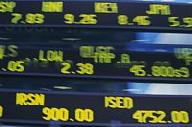Definition of Derivative

Derivative
A financial instrument that is based on some underlying asset.
For example, an option is a derivative instrument based on the right to buy or
sell an underlying instrument.
Related Terms:
Contracts such as options and futures whose price is derived from the price of the
underlying financial asset.
Markets for derivative instruments.
A financial security, such as an option, or future, whose value is derived in part from the
value and characteristics of another security, the underlying security.
security’s risk-free interest rate.
A trend allowing creation of securities either by combining primitive and derivative
securities into one composite hybrid or by separating returns on an asset into classes.
Also called spot markets, these are markets that involve the immediate delivery of a security
or instrument.
Related: derivative markets.
Agreement to buy or sell a set number of shares of a specific stock in a designated future
month at a price agreed upon by the buyer and seller. The contracts themselves are often traded on the futures
market. A futures contract differs from an option because an option is the right to buy or sell, whereas a
futures contract is the promise to actually make a transaction. A future is part of a class of securities called
derivatives, so named because such securities derive their value from the worth of an underlying investment.

International Swap Dealers Association. Formed in 1985 to promote uniform practices in the writing,
trading, and settlement of swaps and other derivatives.
The ratio of a change in the option price to a small change in the option volatility. It is the partial
derivative of the option price with respect to the option volatility.
The total number of derivative contracts traded that not yet been liquidated either by an
offsetting derivative transaction or by delivery. Related: liquidation
Gives the buyer the right, but not the obligation, to buy or sell an asset at a set price on or before a
given date. Investors, not companies, issue options. Investors who purchase call options bet the stock will be
worth more than the price set by the option (the strike price), plus the price they paid for the option itself.
Buyers of put options bet the stock's price will go down below the price set by the option. An option is part of
a class of securities called derivatives, so named because these securities derive their value from the worth of
an underlying investment.
A term that refers to a relatively simple derivative financial instrument, usually a swap or other
derivative that is issued with standard features.
Diagram showing the possible payoffs from a derivative investment.
Customized hybrid instruments created by blending an underlying price on a cash instrument with
the price of a derivative instrument.
To buy or sell short; that is, to have some amount that is owned or owed on an asset or
derivative security.
Traders
Persons who take positions in securities and their derivatives with the objective of making profits.
Traders can make markets by trading the flow. When they do that, their objective is to earn the bid/ask spread.
Traders can also be of the sort who take proprietary positions whereby they seek to profit from the directional
movement of prices or spread positions.

Underinvestment problem
The mirror image of the asset substitution problem, wherein stockholders refuse
to invest in low-risk assets to avoid shifting wealth from themselves to the debtholders.
Underlying
The "something" that the parties agree to exchange in a derivative contract.
Unmatched book
If the average maturity of a bank's liabilities is less than that of its assets, it is said to be
running an unmatched book. The term is commonly used with the Euromarket. Term also refers to the
condition when a firm enters into OTC derivatives contracts and chooses to hedge that risk by not making
trades in the opposite direction to another financial intermediary. In this case, the firm with an unmatched
book hedges its net market risk with futures and options, usually.
Related expressions: open book and short book.
capital structure, or capitalization
Terms that refer to the combination of
capital sources that a business has tapped for investing in its assets—in
particular, the mix of its interest-bearing debt and its owners’ equity. In a
more sweeping sense, the terms also include appendages and other features
of the basic debt and equity instruments of a business. Such things
as stock options, stock warrants, and convertible features of preferred
stock and notes payable are included in the more inclusive sense of the
terms, as well as any debt-based and equity-based financial derivatives
issued by the business.
equity
Refers to one of the two basic sources of capital for a business, the
other being debt (borrowed money). Most often, it is called owners’
equity because it refers to the capital used by a business that “belongs”
to the ownership interests in the business. Owners’ equity arises from
two quite distinct sources: capital invested by the owners in the business
and profit (net income) earned by the business that is not distributed to
its owners (called retained earnings). Owners’ equity in our highly developed
and sophisticated economic and legal system can be very complex—
involving stock options, financial derivatives of all kinds, different
classes of stock, convertible debt, and so on.
Binomial model
A method of pricing options or other equity derivatives in
which the probability over time of each possible price follows a binomial
distribution. The basic assumption is that prices can move to only two values
(one higher and one lower) over any short time period.
Delta
The rate of change of the price of a derivative security relative to the
price of the underlying asset; i.e., the first derivative of the curve that relates
the price of the derivative to the price of the underlying security.
Gamma
The rate of change of delta for a derivative security relative to the
price of the underlying asset; i.e., the second derivative of the option price
relative to the security price.
Greeks
Collectively, "greeks" refer to the financial measures delta, gamma,
lambda, rho, theta, and vega, which are sensitivity measures used in
evaluating derivatives.
Option
A right to buy or sell specific securities or commodities at a stated
price (exercise or strike price) within a specified time. An option is a type of
derivative.
Theta
The rate of change in the price of a derivative security relative to time.
Theta is usually very small or negative since the value of an option tends to
drop as it approaches maturity.
Vega
The rate of change in the price of a derivative security relative to the
volatility of the underlying security. When vega is large the security is
sensitive to small changes in volatility.

Accumulated Other Comprehensive Income
Cumulative gains or losses reported in shareholders'
equity that arise from changes in the fair value of available-for-sale securities, from the
effects of changes in foreign-currency exchange rates on consolidated foreign-currency financial
statements, certain gains and losses on financial derivatives, and from adjustments for underfunded
pension plans.
Related to : financial, finance, business, accounting, payroll, inventory, investment, money, inventory control, stock trading, financial advisor, tax advisor, credit.




